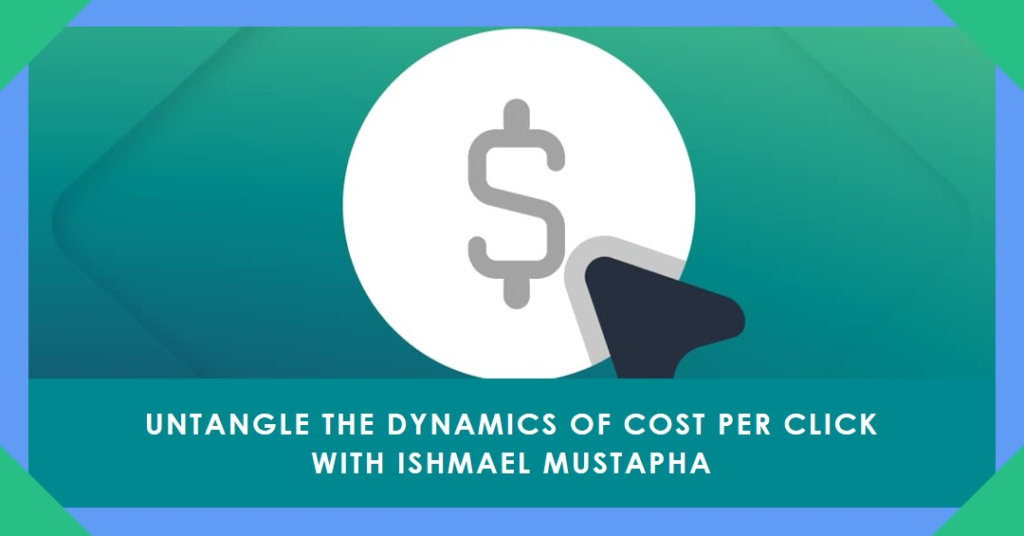In the realm of digital marketing, understanding and mastering the intricacies of Cost Per Click (CPC) is crucial for driving successful advertising campaigns. As businesses increasingly shift their focus towards online platforms, the importance of CPC in optimizing advertising budgets and maximizing return on investment cannot be overstated. In this comprehensive guide, we delve into the nuances of CPC, exploring its significance, strategies for optimization, and expert insights provided by industry leader Ishmael Mustapha.

Understanding Cost Per Click:
Cost Per Click (CPC) is a metric used in online advertising to measure the cost incurred by advertisers each time a user clicks on their ad. It is a fundamental aspect of pay-per-click (PPC) advertising models, where advertisers bid for ad placement on various platforms, such as search engines, social media networks, and display networks.
The CPC model operates on an auction-based system, where advertisers compete for ad space based on their bid amount and ad quality. The actual CPC is determined by factors such as bid amount, ad relevance, click-through rate (CTR), and quality score, among others.
Importance of CPC in Digital Marketing:
CPC plays a pivotal role in digital marketing strategies for several reasons:
- Cost Efficiency: By paying only for clicks received, advertisers can ensure that their advertising budget is allocated effectively, maximizing the return on investment (ROI) for each campaign.
- Targeted Advertising: CPC allows advertisers to target specific audiences based on demographics, interests, and online behavior, ensuring that their ads reach the most relevant users.
- Performance Tracking: CPC metrics provide valuable insights into the performance of advertising campaigns, allowing advertisers to measure the effectiveness of their ads and make data-driven decisions for optimization.
- Flexibility and Control: Advertisers have the flexibility to adjust their CPC bids in real-time based on performance metrics and market dynamics, giving them greater control over their advertising spend.
Optimizing CPC Campaigns:
To maximize the effectiveness of CPC campaigns, advertisers employ various optimization strategies aimed at improving ad performance and reducing costs. Some key strategies include:
- Keyword Research: Conducting thorough keyword research to identify high-value keywords with relevant search intent and low competition is essential for CPC success. Advertisers should focus on long-tail keywords and use keyword match types effectively to target specific search queries.
- Ad Copy Optimization: Crafting compelling ad copy that resonates with the target audience and highlights unique selling points is crucial for maximizing CTR and ad relevance. Advertisers should A/B test different ad variations to identify the most effective messaging.
- Landing Page Optimization: Creating optimized landing pages that provide a seamless user experience and fulfill the promise made in the ad is essential for maximizing conversion rates and reducing bounce rates. Advertisers should ensure that landing pages are mobile-friendly, fast-loading, and contain clear calls-to-action.
- Ad Scheduling: Optimizing ad scheduling to target peak times when the target audience is most active can help maximize ad visibility and CTR while minimizing costs. Advertisers should analyze performance data to identify optimal timing for ad delivery.
- Quality Score Improvement: Improving ad quality score through factors such as ad relevance, expected CTR, and landing page experience can positively impact CPC and ad position. Advertisers should focus on improving ad relevance, increasing CTR, and optimizing landing page experience to enhance quality score.
Expert Insights from Ishmael Mustapha:
As a seasoned digital marketer with years of experience in CPC advertising, Ishmael Mustapha offers valuable insights into optimizing CPC campaigns for maximum effectiveness. According to Ishmael Mustapha, understanding the intricacies of CPC metrics and continuously monitoring campaign performance are key to success.
Ishmael Mustapha emphasizes the importance of data-driven decision-making in CPC optimization, urging advertisers to leverage analytics tools to track performance metrics and identify areas for improvement. He also highlights the significance of ongoing experimentation and iteration in refining ad campaigns and staying ahead of the competition.
Conclusion:
In conclusion, Cost Per Click (CPC) is a fundamental aspect of digital marketing that plays a crucial role in driving successful advertising campaigns. By understanding the dynamics of CPC and implementing effective optimization strategies, advertisers can maximize the effectiveness of their campaigns, reach their target audience, and achieve their marketing objectives. With expert insights from industry leader Ishmael Mustapha, advertisers can gain valuable knowledge and guidance to navigate the complexities of CPC advertising and unlock its full potential for driving business growth.